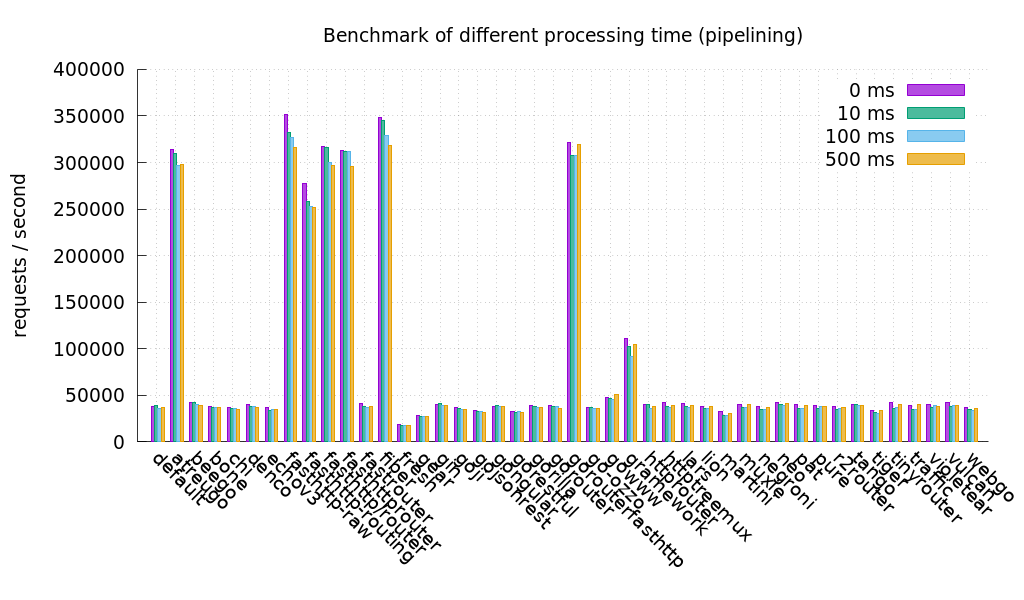An Express-inspired web framework
written in Go.
Fiber is a Go web framework built on top of Fasthttp, the fastest HTTP engine for Go. It's designed to ease development with performance in mind.
package main
import (
"log"
"github.com/gofiber/fiber/v2"
)
func main() {
app := fiber.New()
app.Get("/", func (c *fiber.Ctx) error {
return c.SendString("Hello, World!")
})
log.Fatal(app.Listen(":3000"))
}
→
Hello, World!
Get Started →…or scroll to learn more.
Robust Routing
Setting up routes for your application has never been so easy! The Express-like route definitions are easy to understand and work with.
app.Get("/", func (c *fiber.Ctx) error {
return c.SendString("GET request")
})
app.Get("/:param", func (c *fiber.Ctx) error {
return c.SendString("param: " + c.Params("param"))
})
app.Post("/", func (c *fiber.Ctx) error {
return c.SendString("POST request")
})
Serve Static Files
Serve your static HTML, CSS, and JavaScript files with ease by defining static routes. You can also serve the contents of multiple directories on the same route!
app.Static("/", "./public")
// => http://localhost:3000/hello.html
// => http://localhost:3000/js/jquery.js
// => http://localhost:3000/css/style.css
// serve from multiple directories
app.Static("/", "./files")
Extreme Performance
Since Fiber is built on top of Fasthttp, your apps will enjoy unmatching performance! Don't believe us? Here's a benchmark that proves how Fiber shines compared to other frameworks:

API-ready
Are you building an API server? We've got you covered! Fiber is the perfect choice for building REST APIs in Go. Receiving and sending data is fast and easy!
app.Get("/api/posts", func (c *fiber.Ctx) error {
posts := getPosts() // your logic
if len(posts) == 0 {
return c.Status(404).JSON(&fiber.Map{
"success": false,
"error": "There are no posts!",
})
}
return c.JSON(&fiber.Map{
"success": true,
"posts": posts,
})
})
Flexible Middleware Support
Choose from a number of already existing middleware or create your own! Use them to verify and manipulate certain requests in your app before they reach your controller.
package main
import "github.com/gofiber/fiber/v2"
func main() {
app := fiber.New()
app.Static("/", "./public")
// app.Static("/", "./public", fiber.Static{Browse: true})
app.Listen(":3000")
}
Low Memory Footprint
Fiber's low memory footprint allows you to implement features without worrying too much about how much memory your application will use. This allows you to focus on your application and its business logic, rather than technical particularities.
Rapid Programming
Take your idea and turn it into reality in no time! Thanks to the well-designed and easy-to-learn API, you can develop your application in record speed (especially if you're coming from an Express.js background).
Template Engines
Want to use a different template engine in your Fiber app? Fear no more! Fiber supports multiple template engines, such as Handlebars and Pug, thanks to the template middleware.
package main
import (
"log"
"github.com/gofiber/fiber/v2"
"github.com/gofiber/template/html"
)
func main() {
app := fiber.New(fiber.Config{
Views: html.New("./views", ".html"),
})
app.Get("/", func(c *fiber.Ctx) error {
return c.Render("index", fiber.Map{
"Title": "Hello, World!",
})
})
log.Fatal(app.Listen(":3000"))
}
WebSocket Support
Use the power of WebSockets in your Fiber app! Build fast interactive user experiences with performance and scalability guaranteed.
app.Get("/ws", websocket.New(func(c *websocket.Conn) {
// Websocket logic
for {
mtype, msg, err := c.ReadMessage()
if err != nil {
break
}
log.Printf("Read: %s", msg)
err = c.WriteMessage(mtype, msg)
if err != nil {
break
}
}
log.Println("Error:", err)
}))
Rate Limiter
With Fiber, limiting repeated requests to public APIs and endpoints is very simple. No more abusive requests!
package main
import (
"log"
"time"
"github.com/gofiber/fiber/v2"
"github.com/gofiber/fiber/v2/middleware/limiter"
)
func main() {
app := fiber.New()
// 3 requests per 10 seconds max
app.Use(limiter.New(limiter.Config{
Expiration: 10 * time.Second,
Max: 3,
}))
// ...
log.Fatal(app.Listen(":3000"))
}
Help & Support
Join our community on Discord — ask questions, share, help others.
Media
📖 Go Fiber by Examples: Working with middlewares and boilerplates
📖 Go Fiber by Examples: Testing the application
📖 Go Fiber by Examples: Delving into built-in functions
📖 Go Fiber by Examples: How can the Fiber Web Framework be useful?
📖 Build a RESTful API on Go: Fiber, PostgreSQL, JWT and Swagger docs in isolated Docker containers
Getting started with Fiber ⚡
Building an Express-style API in Go with Fiber
Fiber v1.9.6 🔥 How to improve performance by 817% and stay fast, flexible and friendly?
🌎 Create a travel list app with Go, Fiber, Angular, MongoDB and Google Cloud Secret Manager
Building a Basic REST API in Go using Fiber
Creating Fast APIs In Go Using Fiber
Is switching from Express to Fiber worth it? 🤔
🚀 Fiber v1.8. What's new, updated and re-thinked?
Fiber released v1.7! 🎉 What's new and is it still fast, flexible and friendly?
Welcome to Fiber — an Express.js styled web framework written in Go with ❤️